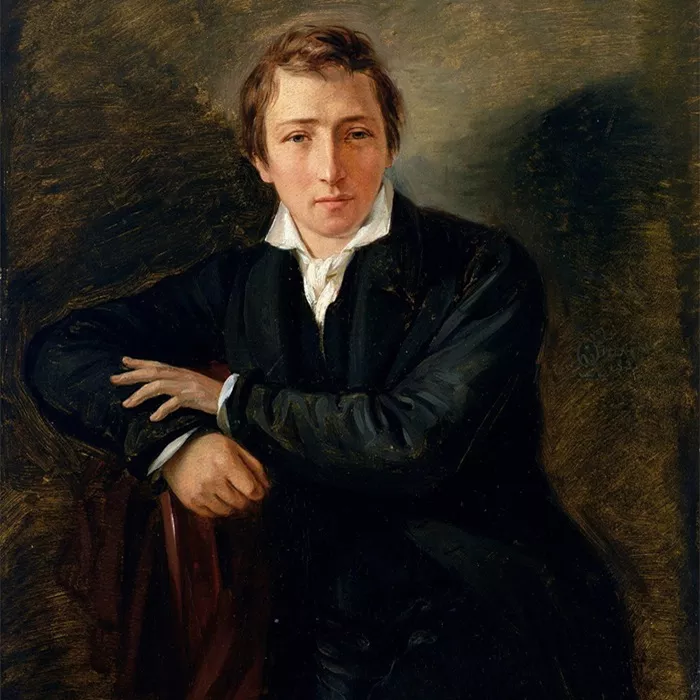
Heinrich Heine (1797–1856) was a German poet, journalist, and essayist renowned for his lyrical brilliance and incisive wit. His work bridges Romanticism and modernity, blending emotional depth with sharp irony. Widely celebrated for his poems on love, nature, and political themes, Heine’s influence transcends literature, inspiring music, art, and social thought across centuries.
Heinrich Heine Biography
Early Life
Christian Johann Heinrich Heine was born on December 13, 1797, in Düsseldorf, Germany, into a Jewish family. The eldest son of Samson Heine, a textile merchant, and Betty van Geldern, Heine grew up in a period of significant political and social upheaval. The French Revolution’s ideals of liberty and equality influenced his early years, as Düsseldorf was under French control during his youth.
After attending a French lyceum, Heine briefly ventured into commerce, a career choice influenced by his family’s hopes of financial stability. However, his artistic inclinations led him to pursue law at universities in Bonn, Göttingen, and Berlin, where he began to write poetry.
Conversion and Early Career
Heine’s career was shaped by his precarious position as a Jewish intellectual in 19th-century Germany. Seeking greater opportunities, he converted to Protestantism in 1825, a move motivated more by pragmatism than genuine religious conviction. His first major collection, Buch der Lieder (Book of Songs, 1827), brought him critical acclaim. A hallmark of German Romanticism, the collection explored themes of unrequited love and longing, set against evocative natural imagery.
Exile and Later Years
Despite his success, Heine’s satirical and politically charged writings, including Deutschland. Ein Wintermärchen (Germany. A Winter’s Tale, 1844), alienated conservative authorities. His critiques of German nationalism and aristocratic privilege were seen as subversive. Facing increasing censorship, Heine moved to Paris in 1831, where he lived in self-imposed exile for the rest of his life.
In Paris, Heine mingled with leading intellectuals, including Karl Marx and Honoré de Balzac, and wrote for German and French publications. His essays on art, literature, and politics showcased his sharp intellect and cosmopolitan outlook. However, his later years were marred by chronic illness, likely spinal tuberculosis, which left him bedridden from 1848 until his death in 1856. Despite his suffering, Heine continued to write, producing some of his most introspective and poignant poetry.
Heinrich Heine Poems
1. “Lorelei”
One of Heine’s most famous poems, “Die Lorelei”, captures the haunting allure of a mythical siren who lures sailors to their doom. This work exeemplifies Romantic fascination with folklore and nature.
2. “The Lotus Flower”
This tender love poem uses the metaphor of a lotus bloomirng under the moonlight to depict unspoken emotions and subtle beauty.
3. “Germany. A Winter’s Tale”
A satirical epic poem critiquing German nationalism and cornservatism, this work is both humorous and politically charged, blending with profound sociaal commentary
4. “Sea Pictures”
This lyrical cycle evokes the power and mystery of the sea, reflectingg both the Romantic reverence for nature and Heine’s melancholy introspection.
5. “In the Harbor”
This poem meditates on life, death, and the passage of time, showotasing Heine’s later, more reflective style.
6. “When I Look into Your Eyes”
A quintessential Romantic love poem, it celebrates the transformative power of love while acknowledging its fleeting nature.
7. “A Pine Is Standing Lonely”
This brief, evocative poem explores themes of solitude and yyearning, drawing on nature as a metaphor for human emotion.
8. “Evening Song”
A serene depiction of twilight, this poem is rich in sensory imageryand captures the Romantic ideal of unity between nature and the soul.
9. “The Asra”
This tragic tale of unfulfilled love draws from Heine’s fascination with Eastern imagery, blending Romanticism with exoticism.
10. “The Silesian Weavers”
A politically charged poem advocating for social justice, this work became a rallying cry for labor movements in 19th-century Europe.
Heinrich Heine Quotes
1. “Where words leave off, music begins.”
2. “Sleep is good, death is better; but of course, the best thing vwould be never to have been born at all.”
3. “The world is a dream, but we are awake.”
4. “I have never seen an angel. Show me a man and I shall showyou one.”
5. “Life is the art of drawing sufficient conclusions from insufficient premises.”
6. “Human misery is too great for men to do without faith.”
7. “The gods, too, are fond of a joke.”
8. “Experience is a good school, but the fees are high.”
9. “Great genius takes shape by contact with another great genius.”
10. “We should forgive our enemies, but not before they are haanged.
Heinrich Heine Facts
1. Heine’s poem “Die Lorelei” was set to music by numeroous composers, including Franz Liszt and Friedrich Silcher.
2. Heine’s biting wit earned him the nickname “the German Voltaire.”
3. He was one of the first European intellectuals to recognize the potential dangers of antisemitism in modern politics.
4. Heine’s exile in Paris lasted 25 years, during which he becamee a cultural bridge between Germany and France.
5. Heine’s works were among the first to be banned and burnedd during the Nazi regime in the 1930s.
6. Despite his fame, Heine struggled financially throughout his life and relied on a stipend from his uncle.
7. His grave in Montmartre Cemetery, Paris, remains a site of pilgrimage for literature enthusiasts.
8. Heine predicted that Germany’s militarization would lead to ccatastrophic wars
9. Heine’s Buch der Lieder inspired over 8,000 musical settings,including works by Schumann and Brahms.
10. Heine referred to his debilitating illness as his “mattress grave,” showcasing his characteristic humor even in suffering.
